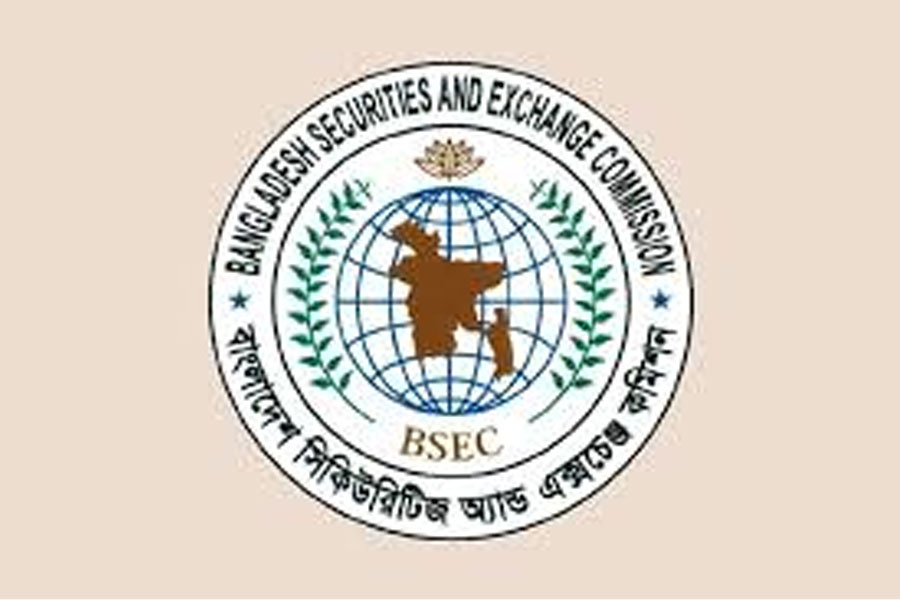BSEC chief faces wrath over media restriction, selection of independent directors
WB to extend support to the securities regulator to improve surveillance system

Published :
Updated :

The chairman of the securities regulator came under fire at a press brief on Sunday over the appointment of independent directors to the prime bourse and allegations of "forced resignation" of a commissioner.
Khondoker Rashed Maqsood, the chief of the regulatory body, also drew flak from journalists publicly for restricting their entry to the office of the Bangladesh Securities and Exchange Commission (BSEC) after his appointment following the ouster of the Sheikh Hasina-led government.
He himself invited journalists on Sunday for a press briefing to share the outcome of his meeting with a delegation of the World Bank.
Mr Maqsood just concluded one month after joining office on August 19. During the month, journalists experienced hurdles to access information from the BSEC and restricted entry to its office.
"We asked journalists to follow the due process," said Mr Maqsood, without any elaboration.
Journalists, who cover the capital market, condemned the move, saying it hinders free flow of information.
The new Commission, however, made a pledge to ensure transparency and accountability.
At his first press briefing on August 25, while unveiling a roadmap for the development of the stock market, the BSEC chairman said that ensuring transparency and accountability would be his first priority.
Mr Maqsood was also criticized on Sunday for the commission under him issuing appointments of independent directors and then cancelling decisions repeatedly. The BSEC for the third time changed candidates for the positions of independent director of the Dhaka Stock Exchange (DSE) last week.
Following the political shift on August 5, the stock market regulator verbally ordered all independent directors, including chairman, of the bourses to resign. The BSEC appointed seven new independent directors to the DSE board first on September 1.
The DSE sent a list of seven individuals to the BSEC for appointment as independent directors of the prime bourse. But the regulator did not pay any heed to it, and made decisions on its own judgment.
Usually, the Nomination and Remuneration Committee (NRC) of the bourses nominate independent directors and place a list to the exchanges' boards for approval. Following the approval, the list is sent to the BSEC for final approval, as per the Demutualisation Act.
However, the BSEC picked seven independent directors of its own choice, saying the bourses had no scope of nominating independent directors in the absence of an NRC as exchanges lost NRCs, each of which must have three independent directors out of five members.
The DSE Brokers Association (DBA) requested the BSEC to reconsider the appointment of independent directors, raising concerns over "conflict of interest".
Subsequently, KAM Mazedur Rahman, former managing director of the DSE, and Dr Md Helal Uddin, a professor of the economics department of the Dhaka University, expressed their inability to join the DSE as questions were raised about their selection as independent directors in violation of administrative regulations.
The appointment of Mr Rahman and Dr Helal in less than three years after leaving directorship in two separate brokerage firms of the DSE was a breach of the Demutualisation Act.
On September 18, the BSEC appointed AF Nesaruddin, partner of Hoda Vasi Chowdhury & Co, and Syeda Zakeerin Bakht Nasir, chief consultant and CEO of ZN Consultants, for the post. In less than 20 hours, it retracted its decision and said the appointees refused to join the DSE board.
Hoda Vasi Chowdhury was the auditor and ZN Consultants worked as a consultant for the DSE, which raises conflict of interest for Mr Nesaruddin and Ms Nasir. The BSEC on September 19, appointed two new independent directors to the premier bourse's board, replacing the two selected the day before. The BSEC finally appointed Mominul Islam, former managing director of IPDC Finance, and Shahnaz Sultana, chief consultant and CEO of FINS Alliance, as new independent directors to the DSE.
The demutualised stock exchange comprises 13 board members: seven independent directors, five shareholder directors (including one representing strategic investors), and the bourse's managing director as an ex-officio member.
Now, the DSE has a full board and the securities regulator will hold its first meeting with the DSE board on Monday, said the BSEC chief when asked about the lack of its interactions with major stakeholders - the bourses.
Journalists also questioned the removal of Dr ATM Tariquzzaman for commissioner post.
The Financial Institutions Division (FID) under the Ministry of Finance decided to remove Mr Tariquzzaman from his position on September 11 and gave him a three-month notice period. Despite that, the BSEC reshuffled the duties of commissioners on September 15, leaving Mr Tariquzzaman without any responsibility.
Later, Mr Tariquzzaman submitted his resignation letter to the Secretary of the FID on September 17. He had served the BSEC since 1997 while the regulatory body was formed in 1993. He was the longest serving and experienced member of the organisation. He also served as DSE managing director.
Preferring anonymity, some market insiders said Mr Tariquzzaman had in-depth knowledge about the capital market and now there was no competent commissioner like him in the BSEC.
When asked about the dismissal of Mr Tariquzzaman, the BSEC chief said some work needed done in coordination with the ministry.
Meeting with World Bank
BSEC Commissioner Farzana Lalarukh told journalists at the briefing that the World Bank (WB) will provide support to the securities commission to upgrade the surveillance system of the regulator to the global standards.
"The present surveillance system of the BSEC is very weak," said Ms Lalarukh, adding that it had not been upgraded since the installation in 2012.
babulfexpress@gmail.com


 For all latest news, follow The Financial Express Google News channel.
For all latest news, follow The Financial Express Google News channel.